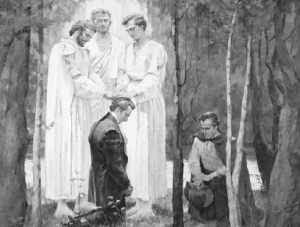 Trying to find a way with Scriptural understanding to reconcile the honest search for Truth and the spiritual destructiveness of unbelief, I found that doubt is not a positive attribute. As described by prophets and the Lord Jesus Christ, doubt is the enemy of faith. Unbelief is slightly worse because of a more concrete condition of the mind and heart, but they are both related to each other. Doubt doesn’t lead to faith. It destroys it by leading to questioning everything; even miracles that we participate in by the Grace of God.
Trying to find a way with Scriptural understanding to reconcile the honest search for Truth and the spiritual destructiveness of unbelief, I found that doubt is not a positive attribute. As described by prophets and the Lord Jesus Christ, doubt is the enemy of faith. Unbelief is slightly worse because of a more concrete condition of the mind and heart, but they are both related to each other. Doubt doesn’t lead to faith. It destroys it by leading to questioning everything; even miracles that we participate in by the Grace of God.
The one instance when doubt brought greater understanding was Acts 10:17 after Peter received his vision of the unclean animals. Religiously speaking, it was a weak doubt because he had complete confidence the vision was real. He simply wondered, “what this vision which he had seen should mean,” and pondered for an answer. His faith in the vision was rewarded with a missionary opportunity to baptise a gentile. He then realized in Acts 10:28 that, “it is an unlawful thing for a man that is a Jew to keep company, or come unto one of another nation; but God hath shewed me that I should not call any man common or unclean.” The use of the word “doubt” in this instance might be the wrong choice of words, when “wondered” might be more appropriate.
Despite modern definitions and meanings, to doubt is not the same as questioning. It is natural and even required by Scripture that we should question. No one can discover truth without inquiring with mind and spirit where it can be found. How we are to question is important to properly growing in faith. There is a form of action involved that goes beyond the intellectual curiosity. It reads in 1 Thes. 5:21 that believers should, “Prove all things; hold fast that which is good.” As always, Jesus Christ explained how this is to be done while teaching at the Temple. His teachings became a source of astonishment to the people attending because he had no formal intellectual training. They asked him how he could know so much without the proper school education and he responded in John 7:16-17 that, “My doctrine is not mine, but his that sent me,” and “If any man will do his will, he shall know of the doctrine, whether it be of God, or whether I speak of myself.” He is teaching that the way to discern spiritual things is to follow what God has already taught. This idea is emphasized in verse 19 when he asks, “Did not Moses give you the law, and yet none of you keepeth the law? Why go ye about to kill me?” Those who do not follow the basic teachings of God cannot comprehend deeper truths and will be stuck with their questions. Continue reading



